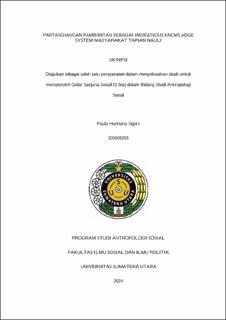| dc.description.abstract | The local wisdom of partangiangan pambibitan is performed by the Tapian Nauli community to ask God for blessings and ask for protection from pangisi ni huta (village fillers) so as not to contradict habonaran ni luat (existing truth). Various conflicts that occurred in the Tapian Nauli community caused the ritual to be buried and not carried out for almost 25 years and caused "sleeping land". However, when the community returned and began to clear the land again, finally this ritual began to be carried out and preserved until now which is packaged with several updates.
This research uses a qualitative approach with data collection techniques through in-depth interviews with 12 informants consisting of 3 categories, namely local people with knowledge of partangiangan pambibitan, religious leaders, and natua-tuani huta (village elders). In addition, the author also conducted observations and live-ins to observe the daily lives of the Tapian Nauli community. This research is located in Tapian Nauli Hamlet, Juhar Village, Bandar Khalipah District, Serdang Bedagai Regency, North Sumatra. The data obtained were then processed using thematic analysis with manual coding techniques.
There are 4 main themes obtained. Partangiangan Pambibitan is a prayer activity carried out by the Tapian Nauli community for the seedling banquet. Partangiangan Pambibitan also has a series of procedures which are divided into 2 sessions by the Tapian Nauli Community. Where the first session is a service and an itak meal led by a priest using procedures carried out from generation to generation, then the second session is carried out for discussion of descending seedlings and siallang na tupa. For the Tapian Nauli Community, when the seedlings want to go down to the field, there are patterns that must be followed. In addition, the Tapian Nauli Community still makes offerings or offerings to pangisi ni huta (village fillers) as a form of respect and requests that everything done by the community be smooth.
The practice of Partangiangan Pambibitan carried out by the Tapian Nauli Community is not necessarily to get protection and blessings from God, and this practice is also closely related to rejecting bad luck. Behind that, the perspective of the people who say that by doing partangiangan pambibitan, the harvest will increase and vice versa, it can even be seen how the social configuration that occurs in the daily life of the Tapian Nauli Community. | en_US |


